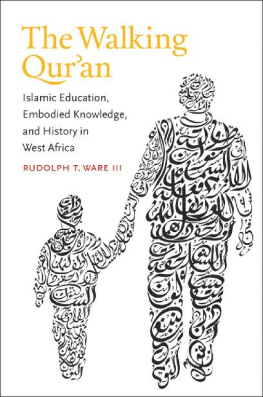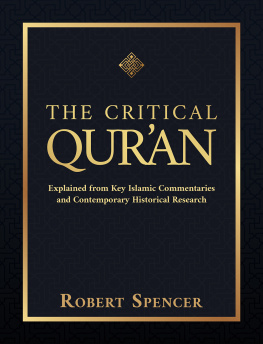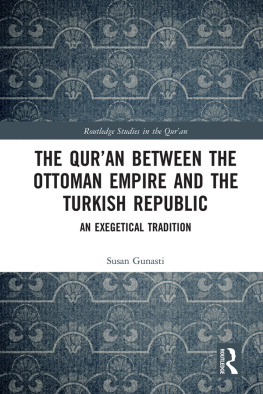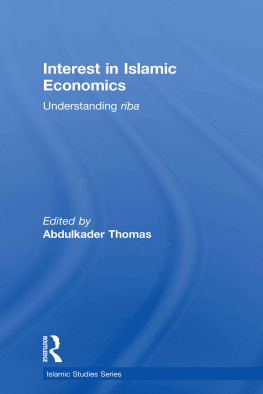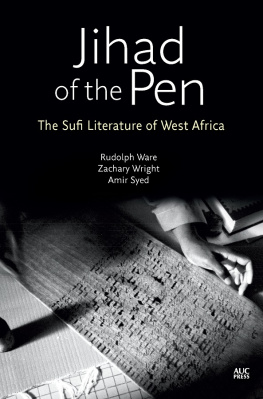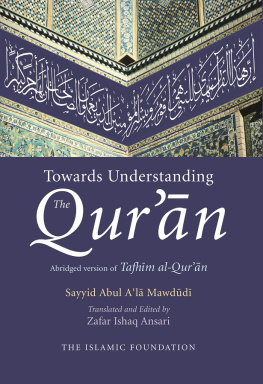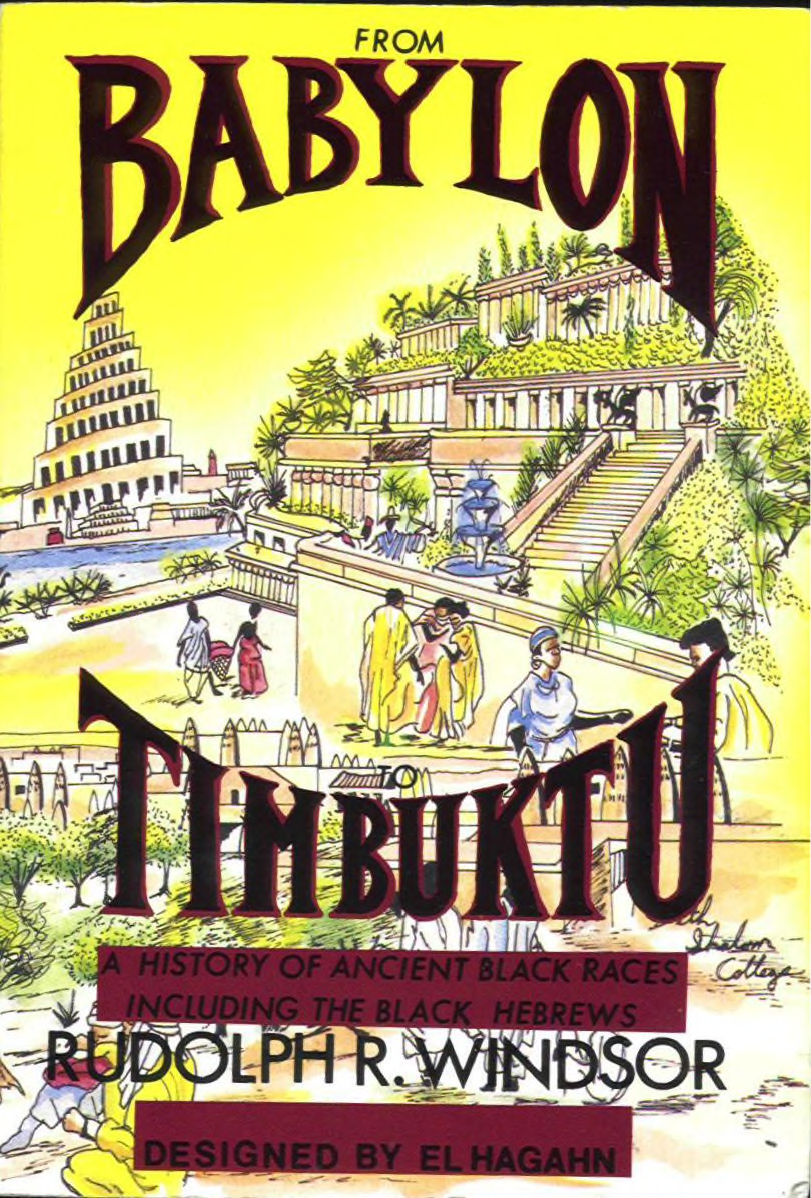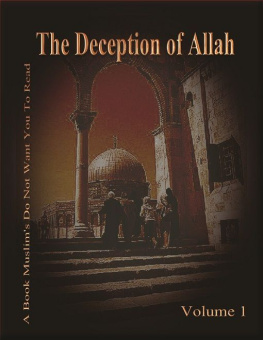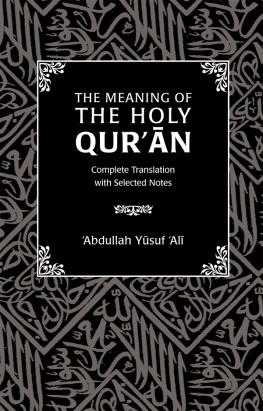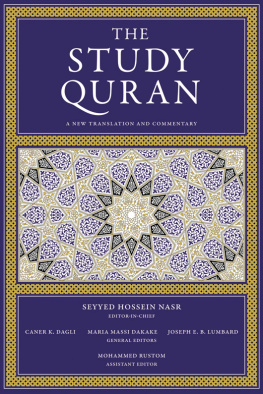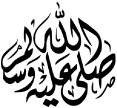The Walking Quran
ISLAMIC CIVILIZATION AND MUSLIM NETWORKS
Carl W. Ernst and Bruce B. Lawrence, editors
A complete list of titles published in this series appears at the end of the book.
The Walking Quran
Islamic Education, Embodied Knowledge, and History in West Africa
Rudolph T. Ware III
The University of North Carolina Press
Chapel Hill
This book was published with the assistance of the Authors Fund of
the University of North Carolina Press.
2014 The University of North Carolina Press
All rights reserved
Manufactured in the United States of America
Set in Minion by Tseng Information Systems, Inc.
The paper in this book meets the guidelines for permanence and durability of the Committee on Production Guidelines for Book Longevity of the Council on Library Resources. The University of North Carolina Press has been a member of the Green Press
Initiative since 2003.
Library of Congress Cataloging-in-Publication Data
Ware, Rudolph T., III
The walking Quran : Islamic education, embodied knowledge,
and history in West Africa / Rudolph T. Ware III.
pages cm (Islamic civilization and Muslim networks)
Includes bibliographical references and index.
ISBN 978-1-4696-1431-1 (paperback)
ISBN 978-1-4696-1432-8 (ebook)
1. Islamic religious educationAfrica, West. 2. Quran
Study and teachingAfrica, West. I. Title.
BP 43. A 358 W 37 2014
297.770966dc23 2013051122
18 17 16 15 14 5 4 3 2 1
Tom Pow, untitled poem, 2007, translated into Arabic in the cover illustration by Everitte Barbee by permission of the author:
A man and a woman once sat down
at a bare table and looked out
at the sky. What needs to be done?
they asked, so that, in later years,
their children or their grandchildren
might ask, What shall we do today?
Lovingly dedicated to the women who have filled my life with joy and wonder: my mother, Christine; my wife, Kaaronica; and my daughters, Samonia, Shamarra, Ismailia, and Rabia
My servant draws not near to Me
with anything more beloved by Me
than the worship I have enjoined
upon him, and My servant draws
ever closer to Me with voluntary
devotions so that I shall love him.
When I love him I am the ear with
which he hears, the eye with
which he sees, the hand with which
he strikes and the foot with which he
walks.
adth Quds, or Holy Saying,
Gods speech as paraphrased by the
Prophet Muammad
Contents
Maps and Illustrations
Maps
2.1 Imperial West Africa, ca. 10001600
3.1 Senegambia, ca. 1800
4.1 Senegal since 1900
Illustrations
A Quran school in Dakar, Senegal, from an early twentieth-century French postcard
Islam in Africa, ca. 2010
lluwas by Shaykhuna Mbakke
Bills victory adh n
Early twentieth-century postcard illustrated by cartoonist and colonist douard Herzig
Advanced taalibo , with switch in hand, teaches young gariibus the Quran in Fuuta Tooro
A typical coeducational Senegambian Quran school
Diai Boukari, or Bukaari Njaay, from a sketch by Mollien that was published in the 1810s
Thiedo, or ceddo , drawn from life by Abb Boilat, ca. 1850
The Army of Fuuta Tooro, from a sketch drawn by Mollien, ca. 1810
Girls at a Quran school in Dakar, Senegal
Ceerno Moodi Bokar Jaalo in his majlis al- ilm , Bokidiaw, Senegal
A sri instructs a taalib in Medina Baye, Kaolack, in 2010
Acknowledgments
Gratitude wells within me as I write these lines that are both a beginning and an end. Though they are the first words for the reader, they are the last for the writer, and thus they are filled with emotion. This book has been an odyssey, a journey to fulfill a mission that has occupied me for much of the past twelve years. In my bodily, spiritual, and intellectual travels, I have accumulated debts of gratitude that can never be repaid. Nonetheless, I offer my inadequate thanks to some of the many people who made this book possible. I humbly ask forgiveness of all those who can be only too briefly mentioned here as well as the many whose names must be omitted for reasons of space. I can only sincerely pray, as people so often do in Senegambia, that God reward all of you for all youve given to me: Yll naa leen Ylla fey.
There is no way of enumerating all of the people who have helped move this book forward during my years in Senegal. I must thank by name, however, Ababacar Fall, Souleymane Bachir Diagne, Mamoudou Sy, Ibrahima Thioub, Ibra Sene, Moulaye Ismal Keita, Cheikh Tidiane Fall, Fatou Niang, and Ahmad Fall. I must also thank Mamadou Ndiaye (of the Islamic Institute), Thierno Ka, Djibril Samb, Papa Ndiaye, Khadim Mback, and Ibrahima Thiaw of the Institut Fondamental dAfrique Noire. At the West African Research Center, Wendy Wilson-Fall, Leo Villalon, Fiona McLaughlin, Leigh Swigart, Ousmane Sene, and many others have helped advance this project. I also thank Saliou Mbaye and Mamadou Ndiaye from the Senegalese National Archives. The people that I need to thank in Fouta Toro, Tivaouane, Kaolack, and Touba are too many to list here, but in Fouta, I thank Thierno Seydou Nourou Ba, Mokhtar Keb, Hachirou and Madani Tall, Oumar Issa Sow, Thierno Mody Bokar Diallo, and Ahmad Sow. In Tivaouane, I owe unpayable debts to Amadou and Ramatoulaye Fall, Mansour Thiam, and Ibrahima Badiane. In Medina-Baye Kaolock, I would be remiss not to most warmly thank Cheikh Tidiane Ciss and his brother, Cheikh Mahi. Finally, I express my heartfelt gratitude to the many people in the heartlands of the Muridiyya who added to this study in countless ways: El-Hadj Ndiaye Ndindy, Moustapha Diattara, and especially Cheikhouna Lo and his entire family in Ngabou and Touba.
I wholeheartedly thank all my colleagues and friends from my formative years at the University of Pennsylvania, especially Steve Feierman, Luther Adams, Lee Cassanelli, Barbara Savage, Barbara von Schlegell, Nancy Farriss, Cheikh Babou, Mamadou Sow, El-Hadj Ndiaye, Deborah Broadnax, Joan Plonski, and the late Valerie Riley. I also thank Jean Allman, Victoria Coifman, Allen Isaacman, and Keletso Atkins, who helped me during my stints of study and teaching at the University of Minnesota. I was also blessed with wonderful friends, colleagues, and mentors during my time at Northwestern University, and many of them read and commented on early drafts of parts of this book. I offer special thanks to Ruediger Seesemann, Zachary Wright, Sherwin Bryant, David Schoenbrun, Robert Launay, Jonathon Glassman, Darlene Clark-Hine, Carl Petry, Rebecca Shereikis, Muhammad Sani Umar, Jock McLane, Regina Graffe, Henri Lauzire, Paula Blaskovits, Susan Hall, Susan Delrahim, and Richard Joseph.
Finally, my time at Michigan has brought wonderful people into my life, and many of them have made valuable contributions to this book. I extend special thanks to Rebecca Scott, Peg Lourie, Derek Peterson, Gabrielle Hecht, Jean Hbrard, Juan Cole, Kali Israel, Nancy Hunt, Joshua Cole, Geoff Eley, Sherman Jackson, Kathleen King, Diana Denney, Dawn Kapalla, Sheila Coley, Diane Wyatt, Connie Hamlin, and Amir Syed. Among the many other colleagues who have contributed in ways great and small to this work, I thank Mamadou Diouf, Andrea Brigaglia, Boubacar Barry, Karima Direche, David Robinson, Ousmane Kane, Bruce Hall, Pier Larson, Carolyn Brown, Ousseina Alidou, Joseph Miller, Benjamin Soares, Charles Stewart, Kim Searcy, Aly Dram, Abdoulaye Niang, Bocar Kane, Denis Gril, Sad Bousbina, Emmanuel Girard-Reydet, and Blandine Pont.

